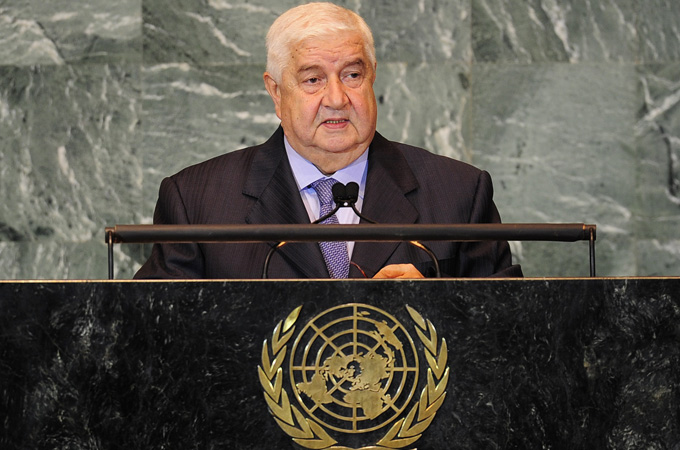Syrian tanks storm strategic town of Rastan
Government troops enter restive town near Homs amid heavy gunfire, residents say, as crackdown on protests continues.

 |
| Syria’s foreign minister blamed ‘foreign intervention’ for the violence in the country during a speech at the UN [AFP] |
Syrian army tanks have stormed the strategic town of Rastan in a bid to stamp out anti-government protests in the centre of the country, residents have said.
Troops, backed by tanks and helicopters, moved into Rastan, seen as a gateway to the north, on Tuesday after hitting the town overnight with heavy gunfire, witnesses said.
The UK-based Syrian Observatory for Human Rights told the AFP news agency that Syrian forces had raked the city with machine gun fire from sunrise, wounding at least 20 people.
Al Jazeera could not immediately confirm reports of injuries due to restrictions on reporting in Syria.
But one activist on the southern edge of the town of 40,000 people told Al Jazeera he could heard firing in the distance.
Another witness, a lieutenant who defected with a group of friends from the Syrian army a month ago, told Al Jazeera by satellite phone that 400 tanks had moved into Rastan, as gunfire rang out in the background.
Rastan lies on the highway to Turkey near the city of Homs and is part of a region that has emerged as a centre of resistance to the government of President Bashar al-Assad.
‘Foreign intervention’
The reports come a day after Syria’s foreign minister blamed “foreign intervention” for the country’s months of violence and for causing delays in Assad’s plans for democratic reforms.
In a speech to the UN General Assembly on Monday, Walid Moualem sought to paint the Assad government as having been on the brink of wide-ranging democratic reforms when foreign-inspired religious radicals and armed groups forced them to put down the rebellion to hold the country together.
“We deeply regret the surge in the activities of armed groups in Syria, which have not waned and instead continued to spiral,” he said.
“The presence of these groups … is the manifestation of foreign intervention.”
Moualem said reforms “had to take a back seat to other priorities. Our overriding priority was facing the external pressures which were at times tantamount to blatant conspiracies.”
As Moualem addressed the world leaders in New York, the violent crackdown on anti-government protesters continued in Syria.
The military campaign has focused on towns and villages north of the city of Homs, where increasing numbers
of defectors have been organising and mounting raids on roadblocks manned by troops and gunmen loyal to Assad.
Official sites hacked
Also on Monday, online activists hacked into the official websites of seven major Syrian cities and several government departments.
The activist groups Anonymous and RevoluSec claimed responsibility for the operation, leaving their mark on sites such as the ministry of transport and ministry of culture.
Activists replaced the official sites with caricatures of the Syrian president and a message saying, “Don’t let Bashar monitor you online”, along with tips on how to avoid detection by Syria’s online intelligence – known as the Syrian electronic army.
Later on Monday, the pro-government Syrian Electronic Army claimed responsibility for briefly defacing the website of Harvard University in the US.
Hackers replaced the home page with an image of Syria’s president, and a message accusing the US of supporting the uprising against Assad, and threatening retaliation.
The office of the United Nations High Commissioner for Human Rights in Geneva has put the number of people killed in the crackdown on the uprising at more than 2,700 since March 15.
The Syrian authorities say 700 police and army personnel have been killed by “terrorists” and “mutineers”.